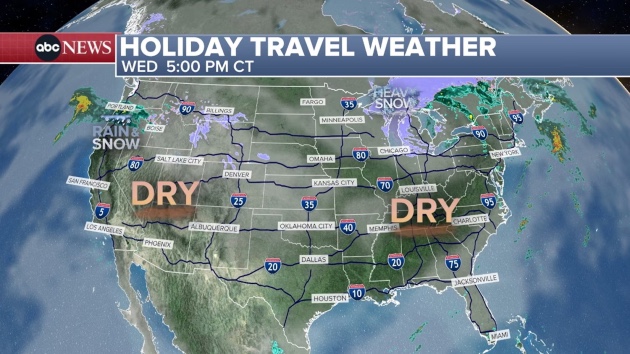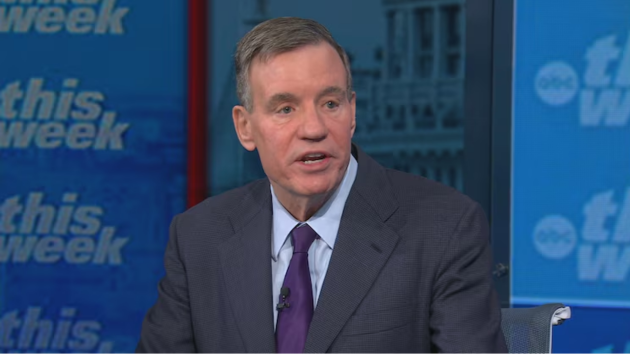
(LONDON) — The United States-proposed Russia-Ukraine peace plan now has fewer points following negotiations in Switzerland to try to make the draft proposal more acceptable to Ukraine, according to a Ukrainian official close to the matter.
The initial 28-point peace plan now has 19 points, according to the official. It is unclear what points were removed.
U.S., European and Ukrainian officials met in Geneva to discuss the contentious proposal put to Kyiv last week, with terms critics say would constitute a Ukrainian capitulation.
On Monday morning, U.S. President Donald Trump hinted at headway being made. “Is it really possible that big progress is being made in Peace Talks between Russia and Ukraine???” he wrote on social media.
“Don’t believe it until you see it, but something good just may be happening,” Trump added.
The talks come as fighting continues to wage in the nearly four-year war. At least four people were killed and 17 were injured in Ukraine’s northeastern city of Kharkiv in what the local mayor called a “massive” Russian drone attack on Sunday night.
“Every night and every day bring new challenges for our city, new destructions and new work,” Mayor Ihor Terekhov said in a post to Telegram.
Kharkiv was among the targets of Russia’s latest overnight attack, which Ukraine’s air force said saw 162 drones launched into the country. Air defenses shot down or suppressed 125 drones, the air force said, with 37 craft impacting across 15 locations.
“The most damage was suffered by civilian infrastructure and private households in the Kharkiv, Chernihiv and Dnipropetrovsk regions,” the air force said in a post to Telegram. “Unfortunately, there are civilian casualties.”
Russia’s Defense Ministry, meanwhile, said its forces shot down at least 103 Ukrainian drones overnight and into Monday afternoon. Four drones were shot down over the Moscow region, of which two were heading toward the capital, the ministry said.
U.S. Secretary of State Marco Rubio said Sunday that the Geneva talks were “probably the most productive and meaningful meeting we’ve had so far in this entire process since we became involved.”
Rubio told reporters that the presidents of both countries would have to approve any framework, but said he was “comfortable” they would.
“We’re making some changes and adjustments in hopes of further narrowing the differences and getting closer to an outcome that both Ukraine and the United States can be comfortable with,” Rubio said.
Rubio later Sunday said that all parties had made “great strides” on a potential peace settlement with Russia. He also said that the deadline for the parties to reach an agreement is “as soon as possible” and that the process could extend past a Thanksgiving deadline set by Trump.
“It evolved. This is a work — this is a living, breathing document every day with input, it changes,” he said of the proposal.
Trump told reporters on Saturday that there is room for further negotiation. Asked by reporters whether the 28-point plan was his last offer, Trump replied, “No.” He added, “One way or another we’ll get it ended.”
But on Sunday, the president criticized Ukraine and its European backers, saying Ukrainian “‘leadership’ has expressed zero gratitude for our efforts” and noting that “Europe continues to buy oil from Russia.”
Asked later on Sunday whether the president still considered the Ukrainians “ungrateful,” Rubio said he believed Trump was now “quite pleased” with progress at the negotiating table.
Ukrainian President Volodymyr Zelenskyy, meanwhile, said in a post to social media on Sunday that his delegation in Geneva “held a series of meetings — with the American side and with our European partners as well.”
“The delegation has just reported on the results of their discussions, and these were substantive conversations. A lot is changing — we are working very carefully on the steps needed to end the war,” Zelenskyy added.
“It is important that there is dialogue with the American representatives and there are signals President Trump’s team is hearing us,” Zelenskyy wrote.
Speaking at a forum in Stockholm, Sweden, on Monday, the president said Kyiv will “continue working with partners, especially the United States, and look for compromises that strengthen, but not weaken us. And we will continue explaining how dangerous it is to pretend that aggression is something one can simply overlook and move on.”
In talks with the U.S. so far, Zelenskyy added, “we’ve managed to keep extremely sensitive points on the table, including the full release of all Ukrainian prisoners of war under the all-for-all formula and civilians, and the complete return of Ukrainian children abducted by Russia. These are important steps, but to achieve real peace, more, more is needed.”
Kremlin spokesperson Dmitry Peskov told reporters on Monday that Russia had “not received anything official yet” regarding the outcomes of the Geneva talks.
“We are, of course, closely monitoring media reports, which have been abundant over the past few days, including from Geneva,” Peskov said.
“We have not seen any plan yet,” Peskov continued. “We have read the statement following the discussions in Geneva. Some adjustments have been made to the text we saw earlier. We will wait. Apparently, the dialogue is continuing there, and some contacts will continue. So far, I repeat, we have not received anything officially.”
On Friday, Russian President Vladimir Putin said during a meeting of his Security Council that the Kremlin had received the new 28-point U.S. proposal. “I believe that it could also form the basis for a final peace settlement, but this text has not been discussed with us in detail,” Putin said.
“I believe the reason is the same: the U.S. administration has not yet managed to secure the agreement of the Ukrainian side, as Ukraine is opposed to it,” Putin added. “Apparently, Ukraine and its European allies are still under the illusion that they can inflict a strategic defeat on Russia on the battlefield.”
ABC News’ Joseph Simonetti contributed to this report.
Copyright © 2025, ABC Audio. All rights reserved.







